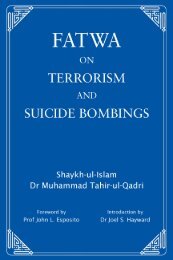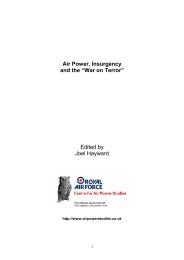Air Power, Insurgency and the âWar on Terrorâ - Prof. Joel Hayward's ...
Air Power, Insurgency and the âWar on Terrorâ - Prof. Joel Hayward's ...
Air Power, Insurgency and the âWar on Terrorâ - Prof. Joel Hayward's ...
Create successful ePaper yourself
Turn your PDF publications into a flip-book with our unique Google optimized e-Paper software.
<str<strong>on</strong>g>Air</str<strong>on</strong>g> <str<strong>on</strong>g>Power</str<strong>on</strong>g> <str<strong>on</strong>g>and</str<strong>on</strong>g> Ethics in <str<strong>on</strong>g>the</str<strong>on</strong>g> Age of <str<strong>on</strong>g>the</str<strong>on</strong>g> Global Salafi Jihad<br />
war (jus in bello) ra<str<strong>on</strong>g>the</str<strong>on</strong>g>r than <str<strong>on</strong>g>the</str<strong>on</strong>g> c<strong>on</strong>diti<strong>on</strong>s in which <str<strong>on</strong>g>the</str<strong>on</strong>g> use of force is initiated (jus ad<br />
bellum) whilst recognising that <str<strong>on</strong>g>the</str<strong>on</strong>g> two issues are intrinsically linked.<br />
Tensi<strong>on</strong> between Ethical Imperatives <str<strong>on</strong>g>and</str<strong>on</strong>g> Strategic Advantage<br />
There has always been a tensi<strong>on</strong> between man’s desire to use violence for political purposes<br />
<str<strong>on</strong>g>and</str<strong>on</strong>g> his desire to restrain violence for ethical reas<strong>on</strong>s. Various philosophical, <str<strong>on</strong>g>the</str<strong>on</strong>g>ological<br />
<str<strong>on</strong>g>and</str<strong>on</strong>g> legal codes have been established in an attempt to balance <str<strong>on</strong>g>the</str<strong>on</strong>g>se c<strong>on</strong>flicting desires.<br />
Just War, as advocated by St Augustine <str<strong>on</strong>g>and</str<strong>on</strong>g> o<str<strong>on</strong>g>the</str<strong>on</strong>g>rs, is <str<strong>on</strong>g>the</str<strong>on</strong>g> primary western code. This<br />
<str<strong>on</strong>g>and</str<strong>on</strong>g> o<str<strong>on</strong>g>the</str<strong>on</strong>g>r codes have at <str<strong>on</strong>g>the</str<strong>on</strong>g>ir core <str<strong>on</strong>g>the</str<strong>on</strong>g> aspirati<strong>on</strong> to minimise unnecessary suffering<br />
to n<strong>on</strong>-combatants. Yet attacks <strong>on</strong> civilians, ei<str<strong>on</strong>g>the</str<strong>on</strong>g>r intenti<strong>on</strong>ally or unintenti<strong>on</strong>ally, is<br />
occasi<strong>on</strong>ally c<strong>on</strong>sidered advantageous. Forgoing such advantage runs counter to <str<strong>on</strong>g>the</str<strong>on</strong>g> basic<br />
instincts of most military strategists. As Carl v<strong>on</strong> Clausewitz said: “to introduce into <str<strong>on</strong>g>the</str<strong>on</strong>g><br />
philosophy of war itself a principle of moderati<strong>on</strong> would be an absurdity”. 402 The tensi<strong>on</strong><br />
between strategy <str<strong>on</strong>g>and</str<strong>on</strong>g> ethics rarely surfaced in classical wars where matters were often<br />
settled between professi<strong>on</strong>al soldiers or sailors in remote fields or <strong>on</strong> <str<strong>on</strong>g>the</str<strong>on</strong>g> open sea. The<br />
industrialisati<strong>on</strong> of society <str<strong>on</strong>g>and</str<strong>on</strong>g>, hence of war during <str<strong>on</strong>g>the</str<strong>on</strong>g> nineteenth century changed<br />
things. Weap<strong>on</strong> producti<strong>on</strong> <str<strong>on</strong>g>and</str<strong>on</strong>g> <str<strong>on</strong>g>the</str<strong>on</strong>g> logistical support to armies (mostly civilian activities)<br />
became potential targets. The c<strong>on</strong>cept of “Total War” had emerged.<br />
Military writers including <str<strong>on</strong>g>the</str<strong>on</strong>g> Italian air power advocate Giulio Douhet recognised <str<strong>on</strong>g>the</str<strong>on</strong>g><br />
potential of independent air power <str<strong>on</strong>g>and</str<strong>on</strong>g> postulated that bombs c<strong>on</strong>taining high explosive<br />
would destroy houses <str<strong>on</strong>g>and</str<strong>on</strong>g> buildings, incendiary bombs would c<strong>on</strong>tinue to damage<br />
remaining structures <str<strong>on</strong>g>and</str<strong>on</strong>g> pois<strong>on</strong> gas bombs would prevent fire-fighters <str<strong>on</strong>g>and</str<strong>on</strong>g> recovery<br />
pers<strong>on</strong>nel from salvaging <str<strong>on</strong>g>the</str<strong>on</strong>g> infrastructure <str<strong>on</strong>g>and</str<strong>on</strong>g> saving lives. Douhet’s <str<strong>on</strong>g>the</str<strong>on</strong>g>ory, <str<strong>on</strong>g>the</str<strong>on</strong>g>refore,<br />
relied <strong>on</strong> <str<strong>on</strong>g>the</str<strong>on</strong>g> deliberate targeting of n<strong>on</strong>-combatant civilians. The British military writer<br />
Basil Liddell-Hart also saw <str<strong>on</strong>g>the</str<strong>on</strong>g> “strategic” potential of disrupting normal life am<strong>on</strong>gst<br />
<str<strong>on</strong>g>the</str<strong>on</strong>g> civilian populati<strong>on</strong> as a means of achieving a quick surrender. The strategy of aerial<br />
bombing, targeting urban areas <str<strong>on</strong>g>and</str<strong>on</strong>g> <str<strong>on</strong>g>the</str<strong>on</strong>g> associated civilian populati<strong>on</strong>, was thus born.<br />
A variant of that strategy was initially tested with c<strong>on</strong>siderable success in <str<strong>on</strong>g>the</str<strong>on</strong>g> British<br />
imperial domini<strong>on</strong>s of Africa <str<strong>on</strong>g>and</str<strong>on</strong>g> <str<strong>on</strong>g>the</str<strong>on</strong>g> Middle East. Most notable of <str<strong>on</strong>g>the</str<strong>on</strong>g>se were <str<strong>on</strong>g>the</str<strong>on</strong>g> RAF<br />
attacks <strong>on</strong> rebel Kurdish villages during <str<strong>on</strong>g>the</str<strong>on</strong>g> 1920s as part of an imperial policing c<strong>on</strong>cept<br />
known as “air c<strong>on</strong>trol”.<br />
While some military thinkers <str<strong>on</strong>g>and</str<strong>on</strong>g> politicians <str<strong>on</strong>g>and</str<strong>on</strong>g> politicians in <str<strong>on</strong>g>the</str<strong>on</strong>g> UK <str<strong>on</strong>g>and</str<strong>on</strong>g> in <str<strong>on</strong>g>the</str<strong>on</strong>g> US,<br />
including Winst<strong>on</strong> Churchill, embraced <str<strong>on</strong>g>the</str<strong>on</strong>g> c<strong>on</strong>cept of “strategic bombing” <str<strong>on</strong>g>and</str<strong>on</strong>g> c<strong>on</strong>vinced<br />
<str<strong>on</strong>g>the</str<strong>on</strong>g>ir treasuries to pay for <str<strong>on</strong>g>the</str<strong>on</strong>g> producti<strong>on</strong> of l<strong>on</strong>g-range bombers in <str<strong>on</strong>g>the</str<strong>on</strong>g> inter-war<br />
years, <str<strong>on</strong>g>the</str<strong>on</strong>g>re was c<strong>on</strong>siderable public unease. The 1930s saw <str<strong>on</strong>g>the</str<strong>on</strong>g> emergence of an active<br />
movement campaigning to make aerial bombardment illegal because of its potential to<br />
kill large numbers of civilians.<br />
162<br />
<str<strong>on</strong>g>Air</str<strong>on</strong>g> <str<strong>on</strong>g>Power</str<strong>on</strong>g>, <str<strong>on</strong>g>Insurgency</str<strong>on</strong>g> <str<strong>on</strong>g>and</str<strong>on</strong>g> <str<strong>on</strong>g>the</str<strong>on</strong>g> “War <strong>on</strong> Terror”





